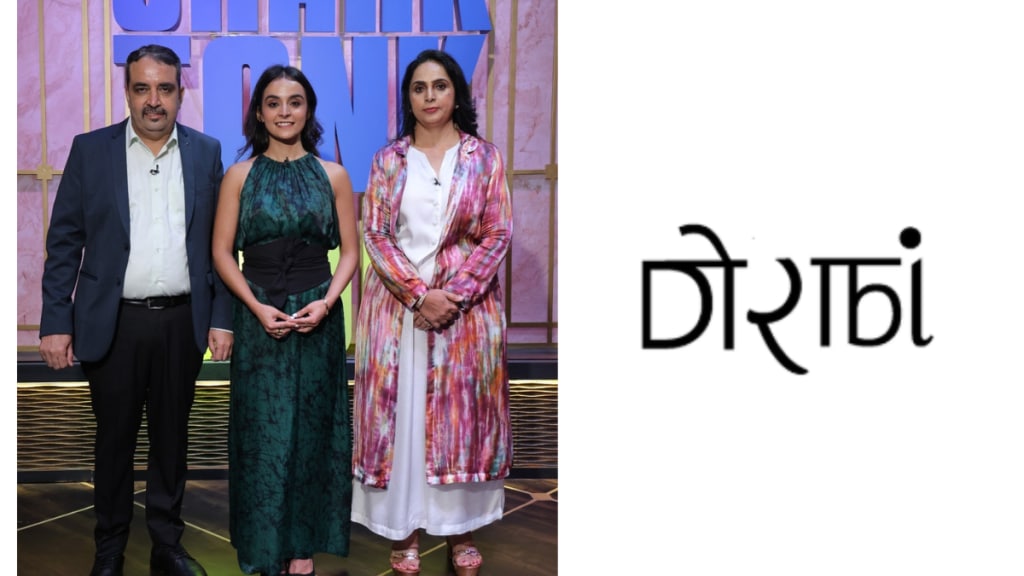Dorabi, a self-proclaimed disruptor in the Indo-Western fashion space, is riding the Shark Tank India wave with ambitions of global expansion. The brand markets itself as a champion of sustainability and inclusivity, but in an industry crowded with similar claims, is it truly offering something unique, or just another fleeting trend? With handcrafted designs and eco-friendly promises, Dorabi has secured investors and media attention—but whether it can translate this momentum into long-term success remains an open question.
“I had a point to prove that I could build something remarkable,” Ashima Batra, CEO and founder, Dorabi, told BrandWagon Online. Yet, in an already crowded market of artisanal fashion, Dorabi faces the challenge of distinguishing itself beyond just bold claims.
Shark Tank India
The brand’s journey, according to its founder, took a dramatic turn with its appearance on Shark Tank India, a process the founder describes as “surreal.” While the show offers immense visibility, not every business that wins a deal on air translates into long-term success. With investors Aman Gupta and Anupam Mittal backing the venture, Dorabi undoubtedly gains credibility. “Having Aman and Anupam on board is a massive win. Their strategic insights will be pivotal in our expansion,” Batra commented. But visibility doesn’t always equal viability. The real test will be scaling operations and proving profitability beyond the initial media buzz.
Batra initially asked for Rs 75 lakhs for 3% equity at a Rs 25 crore valuation. After negotiations, they secured Rs 1 crore for 4% equity from Sharks Aman Gupta and Anupam Mittal. An interesting highlight from their pitch was their past failure, where they lost Rs 70 lakhs due to misleading guidance from so-called “brand architects”. Another notable moment was when Anupam Mittal humorously questioned Ashima about seeking external funding despite already saving Rs 65 lakhs, to which she confidently responded that while her father would always support her, she wanted to scale independently.
The revenue model
Dorabi and its sister brand Aamili operate on a direct-to-consumer (D2C) model, reporting a combined monthly revenue of Rs 50 lakh. But is that enough to sustain long-term growth? “We’re doubling down on international expansion, collaborating with influencers and celebrities, and diversifying into new product segments,” Batra shared. Yet, influencer collaborations can be hit-or-miss, and without a clear differentiation in product offering, Dorabi risks becoming just another fleeting trend in the fast-moving fashion industry.
The affordability vs. quality debate
Scaling a fashion business is challenging, and ensuring quality while keeping costs low is an ongoing struggle. Dorabi claims its in-house manufacturing helps maintain control over quality and sustainability. “We produce responsibly, using fade-free, toxin-free dyes,” the founder noted. While these are strong commitments, the fashion industry often faces scrutiny over sustainability claims, making it essential for Dorabi to build trust through transparency.
Instagram and performance marketing have played a key role in building Dorabi’s brand. “We’re shifting focus towards strategic collaborations with influencers and celebrities who align with our brand values,” Batra shared. While influencer marketing has proven effective for many brands, maintaining long-term customer loyalty will require more than just social media buzz. The brand’s next challenge will be ensuring sustained engagement beyond initial hype.
Competing in a crowded market
With online fashion marketplaces expanding and numerous brands embracing sustainability, Dorabi faces stiff competition. The founder emphasises a digital-first strategy, with plans to enter physical retail via experiential pop-ups. “We’ll start with experiential pop-ups before transitioning into standalone stores,” she said. While this is a logical approach, executing it successfully in an already saturated market will require careful planning and differentiation.
The road ahead is lined with both opportunities and obstacles. While Shark Tank exposure provides a credibility boost, many past contestants have struggled to maintain momentum. Can Dorabi successfully scale while staying true to its handcrafted, sustainable ethos—or will it become yet another brand that promised too much and delivered too little?


